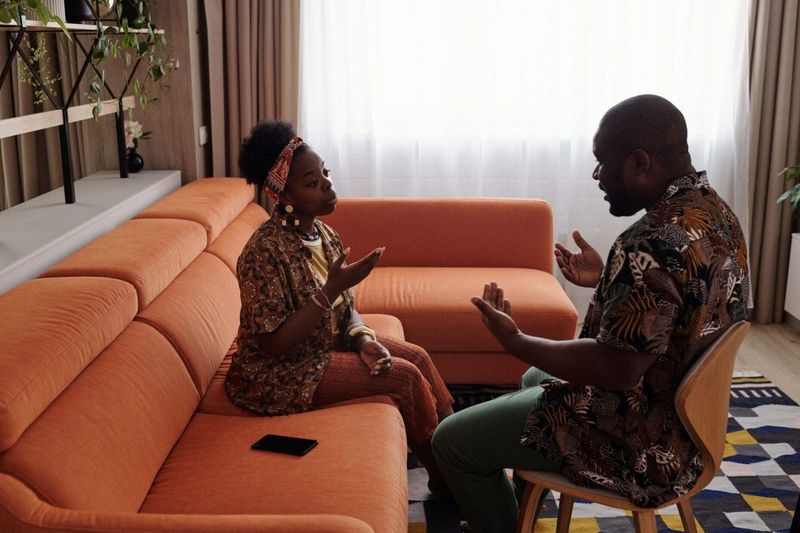15 Relationship Hurdles Every Serious Couple Faces (And How To Conquer Them)
Relationships are a beautiful journey, but even the strongest couples face challenges that test their bonds. Navigating these hurdles with understanding and patience can transform obstacles into opportunities for growth.
Whether it’s communication breakdowns or dealing with external pressures, knowing how to approach these issues can make all the difference. Here are 15 common relationship hurdles every serious couple faces, along with practical advice on how to conquer them.
1. Feeling More Like Roommates Than Lovers

Over time, the initial spark in a relationship may dim, making you feel more like roommates than lovers. This shift often happens when routine takes over, and the excitement of new experiences fades. But rekindling that spark doesn’t have to be a grand affair. Try to introduce small gestures, like planning surprise dates or simply spending quality time together without distractions.
Communicate openly about your desires and needs, and make an effort to connect on a deeper level. A shared hobby or even a new adventure can reignite the passion that first brought you together. Remember, it’s the small moments that often count the most.
2. One of You Shuts Down During Conflict

When tensions rise, it’s common for one partner to shut down, avoiding confrontation. This behavior can stem from past experiences or simply being overwhelmed. To break this cycle, both partners need to feel safe expressing themselves. Practice active listening and give each other space to cool down if needed. Once emotions settle, revisit the issue with a calm mindset.
Setting ground rules for arguments, like taking breaks and avoiding blame, can help keep discussions productive. Remember, resolving conflict is about understanding each other, not winning. Building this kind of communication can strengthen your bond significantly.
3. You Keep Having the Same Argument

Repetitive arguments can feel like an endless loop, draining the relationship’s energy. These recurring battles often indicate unresolved core issues. Identifying the root cause is crucial. Sit down together and discuss what truly bothers you without pointing fingers. Consider seeking external help, like a relationship counselor, to gain new perspectives.
Understanding each other’s underlying fears and needs can diffuse tension and pave the way for real solutions. It’s essential to approach these conversations with empathy and a genuine desire to change the pattern. Breaking free from this cycle can bring about a refreshing sense of harmony.
4. Intimacy Feels Like a Chore

When intimacy becomes routine, it loses its magic, turning into just another task. This can happen when life’s demands overshadow personal connections. To rejuvenate intimacy, prioritize it in your relationship just like any other essential activity. Explore new ways to connect, both physically and emotionally.
Open conversations about fantasies or desires can also reignite the spark. Consider scheduling intimate moments if spontaneity is lacking. It’s about creating an environment where both partners feel valued and desired. This takes effort and understanding but can lead to a more fulfilling and connected relationship.
5. You Avoid Tough Conversations

Avoiding difficult discussions is a common hurdle, often arising from fear of conflict or hurting each other’s feelings. However, avoidance can lead to misunderstandings and resentment. Encourage open dialogue by creating a safe space where both partners can express their thoughts without judgment. Practice empathy and validate each other’s feelings, even if you disagree.
Sometimes, writing down your thoughts beforehand can help organize them. Remember, addressing issues head-on fosters trust and prevents small matters from escalating. It’s about building a foundation where honesty and openness are the norms rather than exceptions.
6. Jealousy Creeps In Unexpectedly

Jealousy can sneak into a relationship unexpectedly, often triggered by insecurity or past experiences. It’s important to address these feelings openly and honestly. Discuss the triggers and reassure each other of your commitment. Building self-confidence and focusing on the positives in the relationship can help mitigate jealousy.
Trust-building exercises and setting boundaries can also be beneficial. Sometimes, understanding the root of jealousy requires introspection and patience. It’s crucial to remember that jealousy isn’t inherently bad; it’s how you deal with it that matters. Handling jealousy maturely can strengthen trust and empathy.
7. Priorities Start Drifting Apart

As life progresses, individual priorities may shift, potentially causing friction between partners. This divergence can feel like you’re moving in opposite directions. Regularly discussing your goals and values ensures alignment. Recognize and respect each other’s ambitions and find common ground where possible. Sometimes, compromise is necessary, but it should be mutual.
Set aside time to reassess your shared vision as a couple. Understanding that change is natural can ease tension and foster a cooperative spirit. A relationship thrives when both partners support each other’s growth, even if it means adjusting paths occasionally.
8. Resentment Builds Over Little Things

Over time, minor annoyances can accumulate, leading to significant resentment. This often happens when issues are left unaddressed. Regular check-ins can prevent small grievances from becoming bigger problems. Encourage a habit of expressing concerns calmly and respectfully. Acknowledging each other’s efforts and expressing gratitude can also help in diluting resentment.
It’s about maintaining a balance between personal needs and relationship harmony. Sometimes, a change in perspective can alleviate tension. Viewing your partner through a lens of understanding rather than criticism can transform the dynamic positively.
9. You’re Not Celebrating Each Other Anymore

Celebrations are a vital part of keeping a relationship vibrant. When you stop acknowledging each other’s achievements and special moments, it can lead to feelings of neglect. Make an effort to celebrate both big milestones and small victories. This doesn’t necessarily require grand gestures; even a heartfelt note can make a difference.
Recognizing each other’s efforts and successes strengthens your bond. It’s about showing appreciation and acknowledging the journey you’re on together. Celebrations inject positivity and remind couples of their shared happiness. Keep the joy alive by making celebrations a regular part of your relationship.
10. One Partner Always “Fixes” the Problems

When one partner takes on the role of the fixer, it can create an imbalance in the relationship dynamic. This pattern often leads to burnout and resentment. Encourage shared responsibility by discussing issues together and exploring solutions as a team. Each partner should feel empowered to contribute equally to problem-solving.
Establishing roles and boundaries can prevent one partner from feeling overwhelmed. Remember, a healthy relationship is a partnership where both individuals support each other. Sharing the load fosters collaboration and mutual respect, leading to a more balanced and harmonious connection.
11. You Struggle to Apologize the Right Way

Apologizing can be challenging, especially when emotions are high. It’s not just about saying sorry but understanding the impact of your actions. To apologize effectively, acknowledge the hurt and express genuine remorse. Avoid making excuses or shifting blame. Instead, focus on how you can make amends and prevent similar issues in the future.
Practicing empathy and active listening can help you understand your partner’s perspective better. Remember, a heartfelt apology can heal wounds and rebuild trust. It’s about demonstrating your commitment to the relationship and willingness to grow together.
12. Outside Stress Leaks Into the Relationship

External stressors, such as work pressures or family obligations, can seep into your relationship, causing tension and disconnect. To manage this, establish boundaries between work and personal life. Communicate openly about your stresses and support each other in finding solutions. Practicing relaxation techniques together, like meditation or exercise, can alleviate stress.
Prioritize quality time without distractions to reconnect. Remember, your relationship can be a sanctuary from external chaos if nurtured well. Building resilience as a couple helps in weathering storms together, turning challenges into opportunities for growth and bonding.
13. One of You Feels Left Out of Big Decisions

Feeling excluded from major decisions can create a rift in any relationship. This often leads to feelings of insignificance or mistrust. To avoid this, involve each other in discussions about significant life choices. Ensure both voices are heard and valued.
Transparency and collaboration are key to decision-making. Regularly checking in with each other about future plans can prevent misunderstandings. Remember, a relationship thrives on teamwork and mutual respect. When both partners contribute to decisions, it strengthens the partnership and builds a foundation of trust and equality.
14. Expectations Never Get Said Out Loud

Unspoken expectations can poison a relationship, leading to disappointment and frustration. It’s essential to articulate your needs and desires clearly. Discuss what you both wish to achieve together and individually. This helps in aligning your goals and understanding each other better. Encourage a culture of openness where expressing expectations is natural.
Misunderstandings often arise from assumptions, so clarity is key. Approach these conversations with patience and empathy. By making expectations explicit, you pave the way for a more harmonious and fulfilling relationship, reducing the risk of unmet needs and resentment.
15. You’re Scared to Be Honest About Doubts

Doubts are natural in any relationship, but fear of expressing them can create emotional distance. To address this, foster an environment where honesty is encouraged. Share your concerns and listen to each other’s apprehensions without judgment. Understanding that doubts are part of growth can help in addressing them constructively.
Encourage vulnerability, as it leads to deeper connections and trust. Sometimes, seeking external guidance, like therapy, can provide a safe space for these discussions. Remember, facing doubts together can strengthen your relationship and help you navigate future challenges with confidence.







